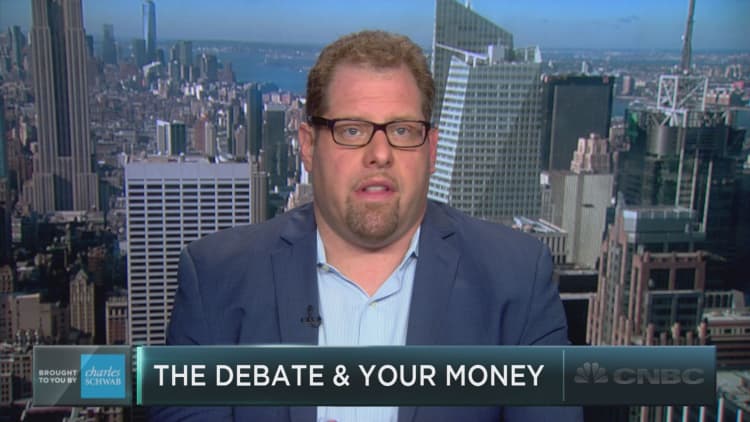


Investors ought to lean to the short side of the market heading into Monday night's presidential debate, according to strategist Neil Azous of Rareview Macro, who sees the stakes as particularly high for the eagerly anticipated meeting of Hillary Clinton and Donald Trump.
"Unlike the adage 'one stock a market does not make,' our view is that 'one debate an election can make,'" Azous wrote in a Sunday note to clients, going on to predict that "this event will dictate asset prices over the next 72 hours more than any other catalyst."
Azous has a specific call on how the debate will shake out, writing that "we can see how Trump wins the debate, but have a hard time seeing how he loses it," given that "every time he got lambasted in the primary debates ... he polled BETTER in the days that followed."
Even if the debate, and the polling reaction to it, merely continue to make a Trump win appear a cogent possibility, the market reaction could be intense.
Azous says that professional asset managers are destined to reduce their long exposure to stocks, or to institute hedges, merely "on account of being responsible." To explain this, Azous hearkens back to how the United Kingdom's vote to leave the European Union surprised pollsters and markets alike.
"Being caught with your pants down once like everyone else is forgivable by an investor, but being caught with your pants down twice in a four-month period makes you irresponsible, and prone to your assets under management being redeemed for poor risk controls," the strategist wrote.
Translation: If Trump wins the election, professional asset managers who see big losses as a result will have a hard time explaining to clients how they missed the signs, particularly if Trump does well in the first debate — and especially if the same thing happened around the so-called Brexit vote.
Interestingly, the candidate himself tweeted in August that "They will soon be calling me MR. BREXIT!" Azous, who is shorting S&P 500 futures in his model portfolio, says money managers ought to take this risk seriously.
Max Wolff, chief economist at Manhattan Venture Partners, similarly discussed a potentially adverse market reaction Friday on CNBC's "Trading Nation," saying that if Trump does well, "the market begins a long overdue process it's more or less refused to do, which is begin to ponder what a Trump presidency looks like."
"Given the uncertainties of someone who's hard to handicap on a number of levels and who doesn't have a long legislative background ... we expect that to be quite negative for overall market sentiment, and we expect the suspension of disbelief to erode rapidly, in the event that Trump is seen to come to a draw or a victory in this particular exchange," Wolff added.
To be sure, not everyone is so concerned. In fact, Convergex strategist Nicholas Colas said Friday on "Trading Nation" that infrastructure and cybersecurity stocks are primed to benefit no matter who is seen as the winner, since both candidates favor increased spending in both areas.
Meanwhile, financial services and energy stocks are "totally up for grabs" given the two candidates' quite different ideas about regulating the two industries, Colas said.
According to poll aggregator Real Clear Politics, Clinton's lead over Trump has fallen to just 2.1 percentage points in a two-way race. Meanwhile, Trump's odds of victory have risen to 48 percent according to FiveThirtyEight's "polls plus" forecast.






